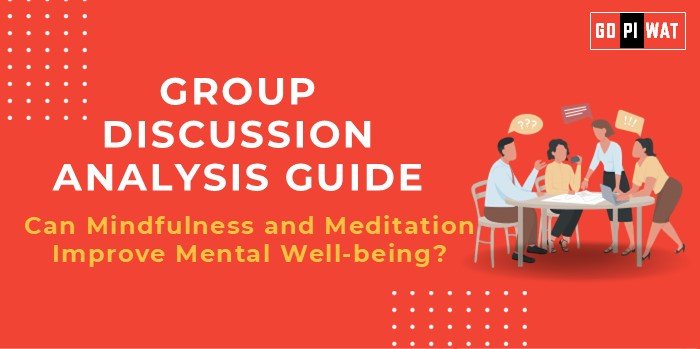📋 Group Discussion (GD) Analysis Guide: Can Meditation and Mindfulness Improve Mental Well-being?
🌐 Introduction to the Topic
Opening Context: Mental health challenges are a growing global concern, with stress and anxiety affecting millions worldwide. Meditation and mindfulness have emerged as promising tools for improving mental well-being, fostering resilience, and enhancing emotional balance.
Topic Background: Rooted in ancient traditions, these practices have gained modern scientific validation. Organizations and educational institutions are incorporating them into wellness programs, emphasizing their importance for holistic health.
📊 Quick Facts and Key Statistics
- 🌍 Stress Epidemic: Over 75% of adults globally report experiencing moderate to high stress levels (WHO, 2023).
- 🧘♂️ Mindfulness Benefits: Regular practice can reduce stress by 40% and improve focus by 20% (American Psychological Association, 2022).
- 🏢 Workplace Integration: Companies offering mindfulness training saw a 30% improvement in employee satisfaction (Harvard Business Review, 2023).
- 💰 Healthcare Savings: Mindfulness reduces healthcare costs by cutting stress-related medical visits by 23% (JAMA, 2023).
👥 Stakeholders and Their Roles
- 🩺 Healthcare Professionals: Promote mindfulness as part of therapeutic programs for mental health.
- 🏢 Corporates: Integrate mindfulness sessions to enhance employee productivity and reduce burnout.
- 📚 Educational Institutions: Include mindfulness in curricula to improve students’ focus and emotional regulation.
- 🏛️ Government and NGOs: Advocate mental health policies and fund mindfulness research and programs.
🏆 Achievements and Challenges
Achievements:
- ✨ Scientific Validation: Studies link mindfulness to improved cognitive and emotional functions.
- 🏢 Adoption in Workplaces: Firms like Google and SAP report increased productivity and reduced absenteeism.
- 📱 Mindfulness Apps: Apps like Headspace have democratized access to mindfulness practices.
- 🌍 Global Movement: Initiatives like World Mindfulness Day raise awareness about its benefits.
Challenges:
- 📉 Accessibility: Limited outreach in rural areas and low-income groups.
- 📣 Misconceptions: Viewed as pseudoscience by skeptics, despite scientific backing.
- 🕒 Sustainability: Difficulty in maintaining consistent practice among beginners.
🌏 Global Comparisons:
- 🇯🇵 Success in Japan: Integrates mindfulness in schools to combat high student stress.
- 🇺🇸 Limitations in the US: Widespread adoption, but lack of standardization and regulation.
📖 Case Study:
Mindfulness in Indian Schools: The Delhi Government’s “Happiness Curriculum” has positively impacted 800,000 students.
📚 Structured Arguments for Discussion
- ✅ Supporting Stance: “Meditation reduces stress and improves focus, as demonstrated by its integration into programs like Google’s Search Inside Yourself.”
- ❌ Opposing Stance: “The lack of universal accessibility and misconceptions about mindfulness limit its impact on a broader scale.”
- ⚖️ Balanced Perspective: “While mindfulness shows proven benefits, its success depends on widespread accessibility and consistent practice.”
🎯 Effective Discussion Approaches
- 💡 Opening Approaches:
- Statistical Start: “Did you know mindfulness can reduce healthcare visits by 23%?”
- Anecdotal Insight: Share impactful success stories of mindfulness.
- Global Context: “Countries like Japan demonstrate the integration of mindfulness in schools as a stress management tool.”
- 🛠️ Counter-Argument Handling:
- Acknowledge doubts and cite scientific studies to counter skepticism.
- Propose accessible solutions like free mindfulness sessions or app promotions.
🔍 Strategic Analysis of Strengths and Weaknesses
Strengths:
- 🌱 Proven stress reduction.
- 🧘♂️ Enhanced focus and emotional balance.
Weaknesses:
- 📉 Initial skepticism and access barriers.
Opportunities:
- 📱 Tech-driven solutions like mindfulness apps.
- 📜 Policy integration in mental health initiatives.
Threats:
- 📉 Cultural resistance in some regions.
- ⚠️ Potential misuse of unregulated mindfulness claims.
🎓 Connecting with B-School Applications
- 🌟 Real-World Applications: Discuss incorporating mindfulness into organizational culture or public health projects.
- ❓ Sample Interview Questions:
- “How would you integrate mindfulness practices in a high-pressure corporate setting?”
- “Evaluate the ROI of mindfulness programs in organizations.”
- 📘 Insights for B-School Students: Mindfulness enhances leadership skills like focus, decision-making, and empathy.


